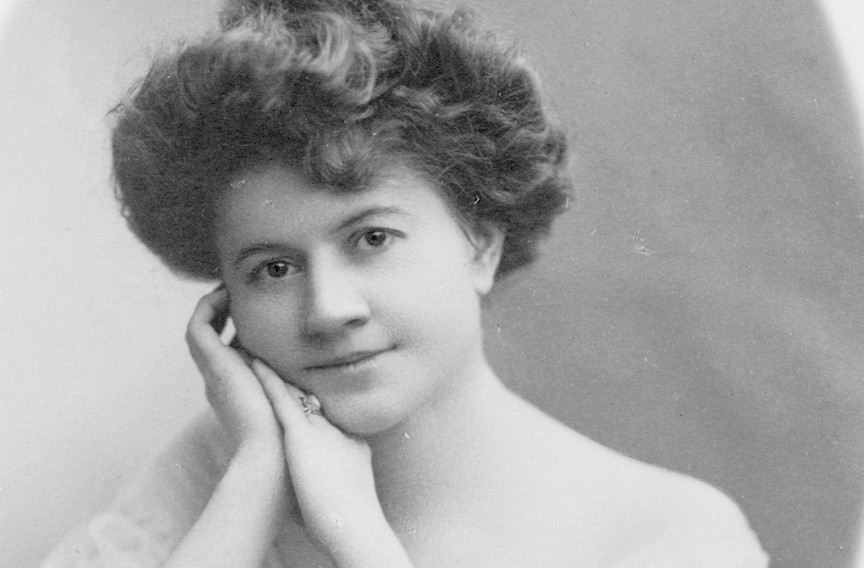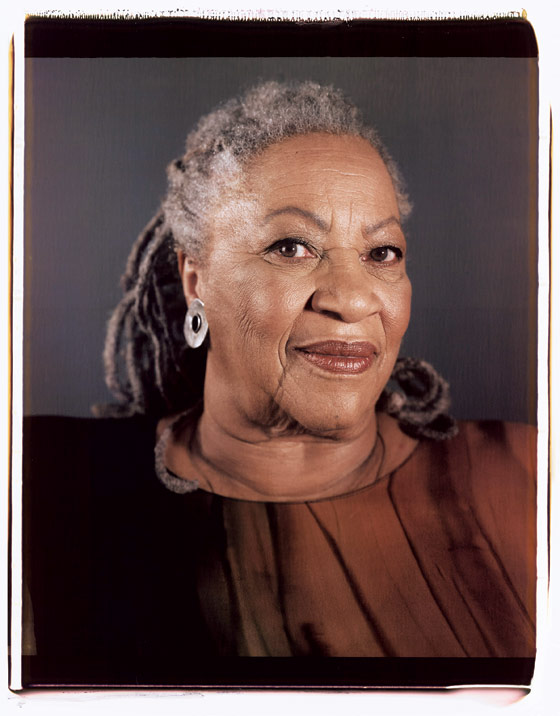"Ellen Glasgow's reputation" says the IWE introduction, "was already good and her novels many, but the publication of Barren Ground in 1926 (?) was what chiefly made it clear that she was a major novelist. Mrs Glasgow wrote not about her own upper-class circles--though later she proved she could do so with equal success--but about the rural people of the countryside near her native Richmond, Virginia. Like fine poetry or music Barren Ground in its writing reflects the temperament of the action depicted, dull or emotional or brisk as the case may be." The "Note on the Author" in the circa 1936 Modern Library edition I had is somewhat more pointed and colorful:
"The proud South at first resented and then acclaimed one of its aristocratic daughters for her revolt against the sentimental tradition of her environment. Born in Richmond, Virginia, Ellen Glasgow had all the advantages of education and leisure of the privileged. After taking her degree and winning a Phi Beta Kappa key at the University of Virginia, Miss Glasgow began her career as an author with the publication of an anonymous novel in 1897. In open defiance of the genteel prejudice against women expressing themselves on such controversial subjects as politics, Miss Glasgow staked her reputation and social position on a novel published under her own name. The Voice of the People was an instantaneous success. Since its appearance one novel has followed another and Miss Glasgow's reputation has grown steadily. Today she ranks as one of the leading women novelists of the country..."
I don't know why the IWE refers to her as "Mrs" while the Modern Library uses "Miss".
Taking into consideration her former status, what I perceive to be the general desire for female writers of the past to be more appreciated, and the circumstance that Barren Ground at least is a book of considerable literary quality that even apart from having a quite empowered heroine for its time offers much of value to the national literary landscape, it is perhaps surprising that Ellen Glasgow is not more remembered. I suspect her handling of race, while not overtly mean-spirited or to me obtrusively offensive given her generation and the atmosphere in which she lived, is not adequate to the requirements of our era. Her overall attitude in this area struck me as having some similarity to Faulkner's (which I hear criticized as well), but of course without his subtlety and force to mitigate some of the more obvious objections to be made. This subject will inevitably come up several times during this report.
Remarkably, I cannot recall ever having read a novel set in Virginia before this, which especially stands out to me because I have lived in that state (though it is my least favorite place that I have lived). I suppose I have read some D.C.-set books where one of the characters lived in Arlington or worked at the Pentagon or a Civil War book where some of the camp or battle scenes took place there, but this is the first I can think of with a domestic setting, extensive description of nature and seasons and local society over a period of many years and so forth. I took a lot of notes on it.
p.5 "...the greater number arrived, as they remained, 'good people,' a comprehensive term, which implies, to Virginians, the exact opposite of the phrase, 'a good family.' The good families of the state have preserved, among other things, custom, history, tradition, romantic fiction, and the Episcopal Church. The good people, according to the records of clergymen, which are the only surviving records, have preserved nothing except themselves."
(Early on) This book is part "The Waltons", part As the Earth Turns, with a hint of Faulkner.
Sexuality in old books is (generally speaking) normal. Conventional love affairs, etc, of a brief duration in which the intensity is even more vanishingly fleeting. Instances of women being highly promiscuous, incest, etc, are understood, or at least presumed, to be unusual. Less anxiety for bourgeois readers, which perhaps they need once in a while.
p.43 "Mrs Oakley looked down on the 'poor white' class, though she had married into it...He had made her a good husband; it was not his fault that he could never get on; everything from the start had been against him; and he had always done the best that he could." I hope my wife doesn't read this passage, lest some truths hit too close to home.
p. 81 "Until yesterday Dorinda had regarded the monotonous routine of the store as one of the dreary, though doubtless beneficial, designs of an inscrutable Providence." That "though doubtless beneficial" is a good piece of characterization.
The use of black dialect throughout here is probably such as to be offensive. Glasgow is not a comic writer, so she is going for realism, not humor. I have seen it done worse, but perhaps we don't need quite so much of it to make the point. On the other hand, is there no value in her having made some record of it? Assuming it is accurate. One presumes that she lived among people like these characters, and that their speech was distinct from that common among the whites, and also she was a conscientious writer of well above average literary skill, so "accuracy" insofar as she is presenting her own interpretation of what she heard, does not seem to me to be problematic and would certainly be in accord with literary custom.
Like many older books, this took around 100 pages to get going. My sense is that consensus opinion today holds that that is too long even for supposedly great books and demands way too much of a person's time to be worthwhile in the modern world. I would dispute that of course, because I like what I take to be the expansive effects of leisurely book-reading on my own mind mostly, though I don't think the trend of even smarter younger people moving away from this practice is really benefiting their cognitive development. Such knowledge as they acquire seems to me to be confined with narrower channels into which more reading perhaps would have allowed more air and a more comprehensive vision.
Old books have two main kinds of pregnancy dilemmas. Either the boy is too low status to avoid a forced marriage/have the problem taken care of, or he is too high status to be forced into marriage (from the girl's point of view). We have the second type of that sad story here.
p. 274 "She wished he wouldn't say 'ni**ers.' That scornful label was already archaic, except among the poorest of the 'poor white class' at Pedlar's Mill." This is somewhat progressive, I suppose, but then a few pages later (281-2) there is the somewhat ubiquitous white author denial/avoidance/whitewashing passage that has become mostly inexcusable in our days:
"Like her mother, she was endowed with an intuitive understanding of the negroes; she would always know how to keep on friendly terms with that immature but not ungenerous race. Slavery in Queen Elizabeth County had rested more lightly than elsewhere...It was true that the coloured people about Pedlar's Mill were as industrious and as prosperous as any in the South, and that, within what their white neighbours called reasonable bounds, there was, at the end of the nineteenth century, little prejudice against them...As for the negroes themselves, they lived contentedly enough as inferiors though not dependents."
My copy, alas, did not have this groovy dust jacket.
p. 324 "Mrs. Oakley was a pious and God-fearing woman, whose daily life was lived beneath the ominous shadow of the wrath to come; yet she had deliberately perjured herself in order that a worthless boy might escape the punishment which she knew he deserved." It is my observation that women authors are much more likely, if not to directly refer to certain male characters in such withering terms as "worthless", "inferior", "cowardly", etc, to develop them at greater length and detail before passing down these oracular judgments, which I find gives them a certain sting whose impression lasts longer than the introduction of such characters in male authors, whose purpose more frequently is merely to give the hero someone to defeat or otherwise display his own overwhelming superiority in contrast with, and whose existence or behavior is otherwise of little significance.
p. 326 "The Lord helps good sleepers." I hope so.
p. 365 "She had seen enough of the world to know that you took your husband...where you found him, and she was troubled by few illusions about marriage."
p. 371 "That, she had learned, was the hidden sting of success; it rubbed old sores with the salt of regret until they were raw again."
p. 372 "Yes, that's the trouble about getting comforts. We always remember that other people went without them. I've got the carpets now that Rose Emily wanted." I like this last quote, there seems to me to be something in it. The two previous I am not as convinced of, but in the context of the book I thought what it revealed about its character's point of view was interesting.
p. 443 "It had never seemed possible to her that Nathan could die. He had not mattered enough for that." This is the main character's husband, whom she married at a rather mature age, 38 or so. It is implied in the book that sexual consummation in this marriage was never achieved. The character, Dorinda, had given herself to a lover at age 20 and been jilted, and the plot of the book is essentially the long grind through the rest of her life to renounce passion and love overcome this setback and the exhausted, narrow life of her rural community to become successful and gain a measure of revenge on her onetime lover, who eventually descends into alcoholism and poverty. This aspect of a woman who determines to get along without dependence on or emotional connection to males or to be weighed down by children was actually rather timely given the recent outpouring of female anger and disgust with much of masculine society that has become so prominent in the culture.
p. 511 "I've seen so many people die," she thought, and then, "In fifty years many people must die." I only note this because this is the point of life that I am at now.
p. 521 "Youth can never know the worst, she understood, because the worst that one can know is the end of expectancy."
Dorinda's struggle with love, both getting over the jilting of her early life and her refusal to engage with it at all in the remainder of the book, I thought was too much. Several times the reader is assured that she has overcome any bitterness or desire for it that she may have had once and for all, but the supposedly suppressed feelings seem to be aroused too easily and too often for this to be wholly credible.
The Bourgeois Surrender Challenge
1. Toni Morrison--The Bluest Eye......................................................1,234
2. William James--The Varieties of Religious Experience....................311
3. Taxi (movie--2004)............................................................................289
4. Winston Graham--Poldark: The Black Moon....................................279
5. D. C. Cab (movie)..............................................................................165
6. Eric Weiner--The Geography of Genius............................................158
7. A.P.J. Abdul Kalam--Wings of Fire..................................................114
8. J.L. Langley--The Tin Star.................................................................109
9. Nathaniel Hawthorne--The Blithedale Romance.................................58
10. Rebecca Morris--A Murder in My Hometown...................................38
11. The Thundermans: Adventures in Supersitting (Vol. 1, Ep. 1)(TV)..30
12. Dara Berger--How to Prevent Autism................................................26
13. 1,001 Wines You Must Try Before You Die (ed. Beckett)..................21
14. Taxicab Confessions (TV Series).........................................................6
15. Reynolds Price--Clear Pictures: First Loves, First Guides.................5
16. Marco Polo New York Guide...............................................................3
First Round
#1 Morrison over #16 Marco Polo New York
Not that I don't love travel guides.
#2 James over #15 Price
I don't know what is supposed to be going on with the Price book.
#14 Taxicab Confessions over #3 Taxi
One of the magic words that was used to call up contestants for this tournament was "cab". Taxicab Confessions, while I don't think it is supposed to be particularly good, sounds more interesting than Taxi, which is rated as dreadful despite the appearance of Gisele Bundchen, the wife of Tom Brady of Ted movies fame.
#4 Graham over #13 1,001 Wines
The Poldark books are evidently popular reading, and literarily respectable enough to get the BBC adaptation treatment. I believe my wife has seen the TV series.
#12 Berger over #5 D. C. Cab
This book sounds like a crock, but even that isn't enough to lose to a legendarily bad movie.
#6 Weiner over #11 The Thundermans
#10 Morris over #7 Kalam
Neither of these books is carried by a single library in my state, and neither of them has a title that excites me.
#9 Hawthorne over #8 Langley
Elite Eight
#1 Morrison over #14 Taxicab Confessions
#2 James over #12 Berger
#4 Graham over #10 Morris
#9 Hawthorne over #6 Weiner
This one was a decent contest following three routs.
Final Four
#1 Morrison over #9 Hawthorne
The game of the tournament. I figure it is time I read something by Toni Morrison, and her first book would seem to be a logical starting point for that.
#2 James over #4 Graham
I have mixed feelings about whether I would like the Poldark books or not. Maybe it could win in a different field.
Championship
#1 Morrison over #2 James

.jpg/220px-Ellen_Glasgow_House_(Richmond%2C_Virginia).jpg)





No comments:
Post a Comment